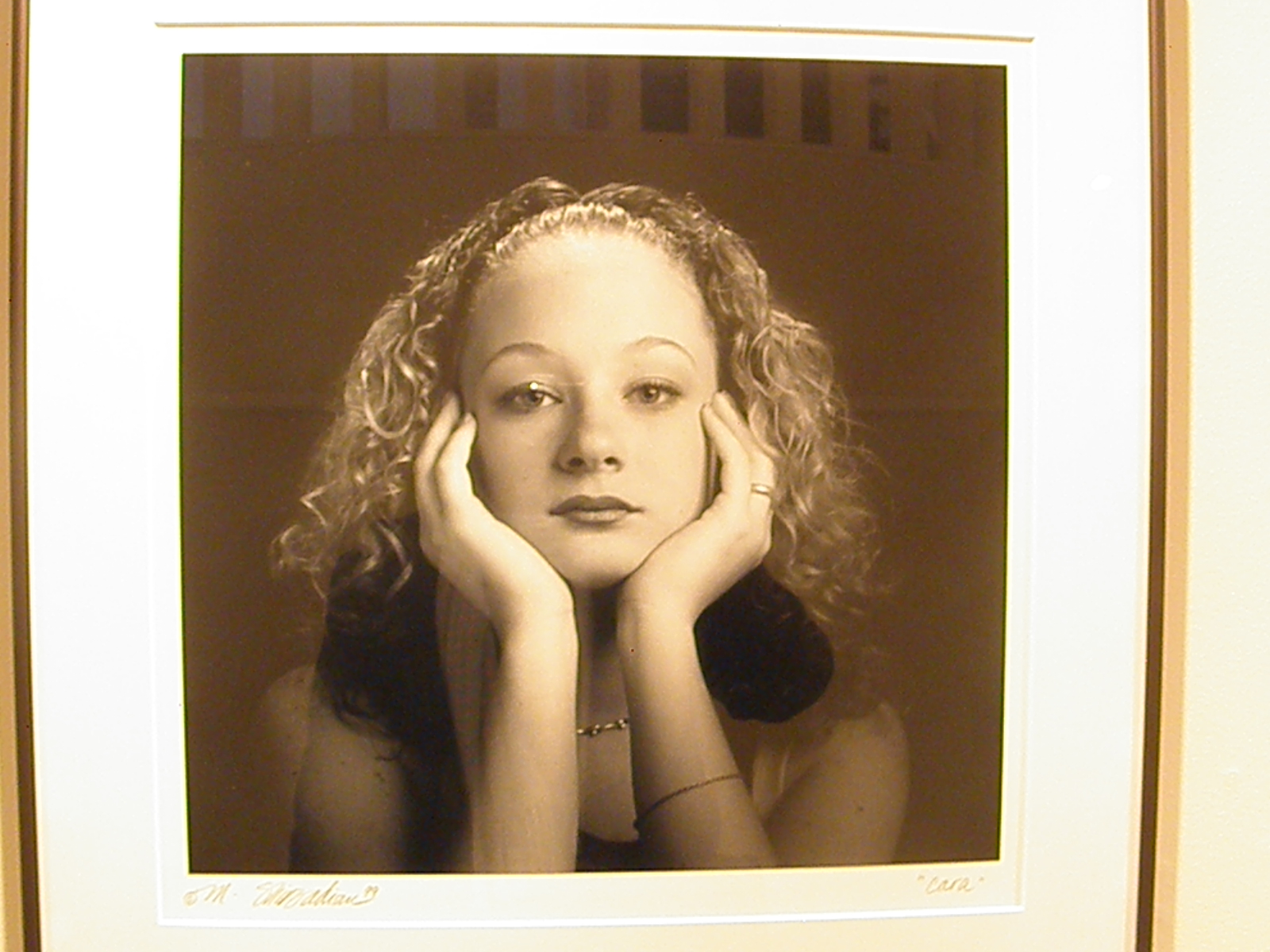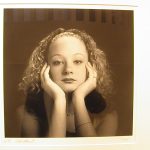The women of “The Vagina Monologues” asked where “all the good men are” last Friday and Saturday during two sold out performances in the Studio Theatre.
“The Vagina Monologues,” written by Eve Ensler, are a collection of monologues based on interviews Ensler conducted with more than 200 women about their personal experiences with subjects ranging from sexuality and female orgasms to global issues and rape culture.
In the last piece of the night, “Over It,” performed by senior Gretchen Curry, Ensler calls out to men in the line, “I am over the passivity of good men. Where the hell are you?”
Junior Macauley O’Connor said Ensler’s expression of frustration in this instance was “an absolutely just one.”
“I think that a lot of men honestly just don’t know what to do to help, and because of that they don’t do anything,” said O’Connor. “The thing that they don’t realize is that the opportunities are out there for anybody to help out with. I know that I’m not going to wait around for more people to get involved in supporting the cause. I’m going to do whatever I can to be as un-passive as possible.”
Sophomore Kate Johnson, one of the show’s producers, said the lines are “a direct challenge to all men to regard violence and rape as a very serious matter, as one that shouldn’t be taken lightly.”
“Many of the monologues focus on issues of violence against women by men, but a lot of them also focus on the fact that the men in our lives are vital and positive forces regarding our sexual and emotional well-being,” Johnson said.
“‘The Vagina Monologues’ want to make people aware that one in three women will be raped, sexually assaulted, or abused in her lifetime, but they also want to show that not all men are part of the problem, but rather the solution.”
Johnson said that a student who attended the performance for a class approached her after the show to tell her that he had never thought about rape in the way that it was presented in the production.
Johnson said the student told her he was glad he attended and he realized the seriousness with which women regard issues of violence and rape.
Junior Leah Shaeffer, co-director of the show and actor in the performance, said that one actress’s father approached her after the first night of the performance to tell her that those lines in “Over It” affected him as well.
“He was so affected by the line about the passivity of good men that he said his blood was boiling over and he just wanted to get out in the world and change every man’s perspective on violence against women,” Shaeffer said.
“Even if this man was the only person so affected by our performance, every minute and dollar that went into it was worth it.”
Senior Mollie Kalaycio, one of the performers in the show, said she felt some men did not fully grasp what the show was trying to say.
“A lot of guys came to see us, and we were really grateful,” said Kalaycio. “I feel like we touched a lot of them with the harsh facts about violence against women, but I also know that some of the men who saw it were a little uncomfortable and didn’t really grasp the reality of what we were saying.”
Kalaycio said she thinks if men who understood the show could talk about it with other men who might have been confused, the message could come across better.
Sophomore Gus Wood, a new member of the Women’s House, read the play before seeing the performance and said he “did not anticipate the waves of emotion that true heartfelt readings of the material would bring on.”
However, Wood said that as an active member of the feminist cause, he felt that some of Ensler’s views were “antiquated.”
“There is a large subset of men who are not only advocates against rape—many are victims of it,” said Wood. “I think the message was an important one, but a little women-centric. Hopefully men who do stand on these issues will stand up and join the fight based on the performance as a whole.”
Wood said he was moved by the women’s performances, and he hopes the campus sees the play as a “catalyst for more active roles in feminist causes.”

Senior Andrea Kraus, co-director and actor in the performance, said they decided to bring the production to OWU because of its relevance to the campus community.
“I wanted the show to reach an audience that included a diverse sampling of the OWU community,” said Kraus. “This means people who are already involved in these issues and people who have never even heard the term ‘rape culture.’”
Kraus said she hoped people took the idea that we are all connected away from the show.
“What happens to women in Bosnia affects the women of the Congo and the women in New Orleans and Delaware, Ohio,” she said. “Women need to support women. Men need to support women. We need to support each other no matter what our sex or gender might be.”
In addition to the play’s focus on rape and sexual violence against women, the show also aimed to de-stigmatize vaginas.
Sophomore Erin Parcells said that the monologues aim to let women know that “your vagina is your vagina.”
“Every female’s vagina is different and that’s okay,” said Parcells. “It’s about feeling good about your vagina and owning that.”
Junior Kaitlin Lentz said she hopes the performance changed the way people think about vaginas.
“It should not be a topic that is made trivial,” Lentz said. “It should be embraced and celebrated because where would we be without vaginas?”
Ninety percent of the proceeds from ticket sales and donations for the show is going to be donated to the foundation CHOICES for Victims of Domestic Violence, a program that addresses the needs of battered women and their children in Franklin County and additonally provides services to Delaware County.
Category: Entertainment
City Art Center seeking to pique public interest
Of the many restaurants, shops, and businesses to visit throughout downtown Delaware, one destination has eluded the attention of many OWU students.
The City Art Center on Winter Street, next to the Strand Theater, has been a part of the Delaware community for a short number of years. The center has drawn little attention from the OWU campus.
Students on campus, who have been living in the Delaware area for many years, have not made it a point to visit the gallery often.
Junior Liza Blakeslee said she had never been inside the building, but has looked at displays and advertisements in the windows.
The center is a non-profit organization that, according to its website, cityartcenter.org, has a “vision to be an active partner within the community
in developing an enriched cultural landscape”.
“It also intends to promote an awareness of and appreciation for the arts by trying to “foster creativity, spark new thoughts, and facilitate conversation…meanwhile establishing a network for artists and the public.”
In order to help promote the organization and its monthly exhibits, the center has partnered with the Strand Theatre for March’s exhibit, entitled, “The Strand Theatre: Scenes from Behind the Screen.”
According to Jessi Walker, the owner and operator of the City Art Center, this new event might be just the thing to bring in the right amount of attention.
“Aside from free popcorn and a rich cultural art experience, the public can catch glimpses into places within our beloved Strand Theatre that no one normally has access to,” said Walker.
Walker also said that, thanks to this upcoming event, the Center will have the benefit of exposing their art space.
“With each exhibition, more and more people find out what we are doing here, so that is very helpful to us. The CAC is operated 100 percent by volunteers in the community, so the more that people discover our space, the more people become involved in making it happen.”
The volunteers at the center said they hope students from OWU can come and check out what the art space has to offer and that they also hope to bring in more appreciation for art and how it operates through the community.
The upcoming event, “The Strand Theatre: Scenes from Behind the Screen” will begin on March 2 and the center will continue to show the exhibit throughout the month. To visit the center, stop by between 4 and 7 p.m. on Fridays and 2 and 7 p.m. on Saturdays.
Band of Skulls’ music like great lit
A car made Band of Skulls famous.
The Southampton, England, blues-rock quartet were virtual unknowns when the fine folks at Ford Motor Company wisely chose to use their song “Light of the Morning” in an ad for the 2011 Mustang. The track leads off the band’s 2009 debut “Baby Darling Doll Face Honey,” which was largely praised by critics.
“Light of the Morning” defines that record—it’s a short, loud jam that leaves the listener wanting more. That want is satisfied, as 11 tracks follow it on “Baby.”
The much-anticipated sophomore album, “Sweet Sour,” takes the band’s sound in a different direction, but by no means fails to achieve what Band of Skulls are best at: enticing.
The lead, title track achieves this end most successfully. The opening riff is easily the sultriest and most seductive I’ve ever heard.
Frontman Russell Marsden’s guitar work and the vocal harmony between him and bassist Emma Richardson are hypnotizing, the song’s abrupt, single-chord ending, serving as the snap of the fingers releasing listeners from its spell.
The final four tracks are an equally beguiling group. “Navigate” and “Hometowns” are so despondent and depressing that a song like “Light of the Morning” is necessary to prevent anyone from contemplating suicide.
The band delivers with the penultimate track, “Lies,” an audacious return to the prevalent sound of Baby. The record’s title is even referenced in the lyrics: “How can you not have a little fun/Doll face honey?”
After “Lies,” the only fitting end to the record would be equally vigorous, right?
Wrong.
“Close to Nowhere” is the bleakest of all 10 songs on “Sweet Sour.” Minimalistic guitar work and a dark, chanting rhythm conjured by drummer Matt Hayward partner with almost nihilistic lyrics about not knowing one’s purpose in life to bring back the wave of gloom “Lies” was supposed to send away.
The track is a prime example of the record’s darker, more personal lyrics.
“Lay My Head Down” deals with a reluctant relinquishing of love, and “Bruises” has overtones addressing the adverse, outward effects of mental illness. The stripped down compositions on these more somber songs succeeds at letting their lyrical themes show through.
The album as a whole, as its title suggests, is a bit of a paradox. The loud, forceful sound of “Baby” is staunchly present on Sweet Sour—“The Devil Takes Care Of His Own” sounds like it could have been on an AC/DC record, and the driving drums and swift guitar and bass of “You’re Not Pretty But You Got It Goin’ On” are just plain fun to listen to.
After the first time around the album, the listener is left somewhat wanting.
This could be a result of the contrast of expectations created by “Baby,” or the desperate thirst for optimism after hearing “Close to Nowhere.”
But this aural teasing is what Band of Skulls are best at. After a few more listens ,the effect they create becomes clearer, and the record gets better and better, but there are still no definite answers. Even after hearing it a multitude of times, it is still packed with wonderful ambiguity.
“Sweet Sour” is like a great piece of literature—the first time through it’s apparent there’s an incredible amount of depth and substance, but it’s uncertain exactly what it is.
After examining it again and again, the meaning is still unclear, but that ambiguity allows for the open development of different interpretations.
With “Sweet Sour,” Band of Skulls have definitively proven that they should never be underestimated.
Guest choreographer brings edge to Orchesis
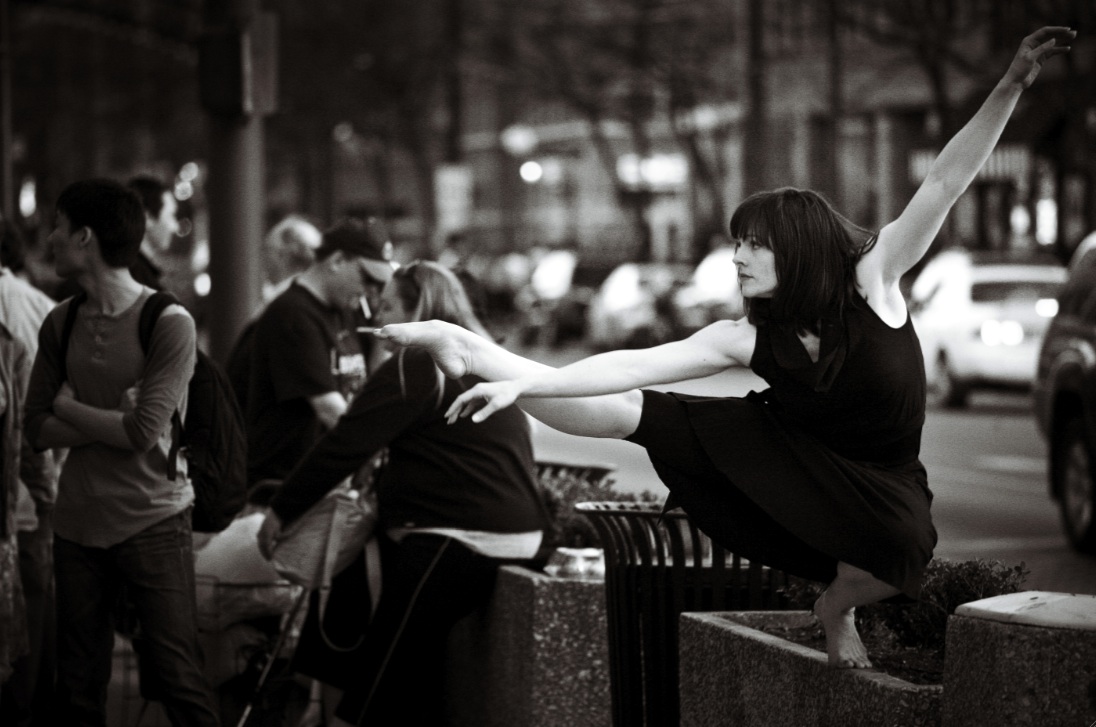
According to the OWU website, Orchesis is the annual contemporary dance concert. The student dance company showcases the works of student choreographers along with works by faculty and guest choreographers. This year, 23 students will present 12 dances exploring a diverse range of themes.
“The concert represents the rich history of dance at OWU and opens a new chapter as talented students perform lively, energetic, thought-provoking, and always entertaining.”
Marin Leggat is in her first year as assistant director of dance and artistic director of Orchesis. Leggat said she wanted to bring something different to the showcase this year.
As a new face to the OWU committee, Leggat brought in a guest choreographer to assist with one of the dances for the show. Groves is currently working as an independent artist in Italy as well as directing “Artist, Interrupted” a non-profit, art collective that focuses on supporting female artists who balance family and art life.
Leggat said Groves’ love and appreciation for dance was what inspired her to bring the alumn back to campus.
“Kristen (Groves) is one of my former high school students,” she said. “We laugh at this now, but at the time, she was pretty closed-minded about modern dance. Having been studio-trained, Kristen really only understood dance as a competitive sport, not necessarily as an art form. When she went to college, she ended up falling in love with artistic dance.”
Leggat said she hoped Groves’ presence would inspire students.
“I felt this would be a fabulous opportunity for OWU dancers,” Leggat said. “Many of whom have had a dance background similar to Kristen’s, to see how their studio training can be valued and also expanded to find a unique voice as a dance artist.”
Groves’ worked intensely with a cast of eight dancers during the first week of this semester, (Jan 16-21). From Mon-Sat, dancers rehearsed with Groves daily for three hours. She directed improvisational scores, taught choreography, and trained the dancers how to perform her particular style.
“Most viewers of my style have called it fierce, physical, complex, and athletic choreography,” Groves said. “My dancing style is a fusion of precision and isolation with traditional modern dance technique. I have always loved to challenge my physical level as a dancer and most of my teaching and choreography is focused on developing athlete-artists.
Grove said her choreography embodies more than just an art form, but a gateway for political and social issues.
“Dance is about expressing ideas,” she said. “Opinions, and narratives that can influence audiences to think more carefully about complex situations. Most of my work has a political focus; I love to choreograph socially-relevant work. To me, dance is advocacy, dance is a debate, and dance is persuasion.”
Leggat said students were excited at this new perspective on dance but were also creatively and physically challenged.
“Kristen (Groves) put everything together during the week,” she said. “By the end of their last rehearsal, the cast was sore, but very excited to be closing the concert with this high-energy piece”.
Both Leggat and Groves are confident and enthusiastic about the showcase. Groves said she hopes she can bring something new to not only Orchesis but the dance program.
“Any strong dance program needs exposure to lots of different styles of movement and different perspectives on approaching dance training,” she said. “My goal was to help the students bring together a strong conceptual idea with strong choreography and movement vocabulary. My movement style is unique in terms of its physical complexity and I wanted to give the students a chance to really push the limits of their physical abilities.”
“Orchesis 2012” will be held at 8 p.m. March 2 and March 3 in Chappelear Drama Center.
Babbling Bishops take improv to a new level
Ohio Wesleyan’s improv- isational comedy troupe, The Babbling Bishops, knows the business of being funny is more than just funny business.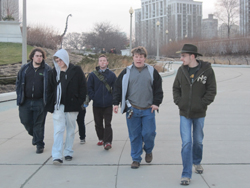
After their recent trip to Chicago to hone their skills through improv workshops, the black t-shirt clad and barefoot “Babblers” are gearing up to put their new knowledge to practice.
Junior Andrew Rossi, also known by his troupe-given name “Attenborough,” explains that the Babbler’s annual trip focuses mainly on strengthening the skills of the troupe.
“Chicago is college for the Bishops,” said Rossi. “We go to be critiqued, to learn new methods of improv and to refine our form both individually and as a group.”
A fellow member, junior David “Pop Fly” Reitan, elaborated a little on what these workshops involve.
“While we were in Chicago we took workshops at the Improv Olympic Theater (iO),” Reitan said. “This is, I believe, our third or fourth consecutive year that we have been taking lessons there.
“We were under the instruction of Greg Hess, a guy who’s been in the biz for about 10-12 years and is part of two groups at iO, one of which, The Cook County Social Club, is revered as the best improv group in Chicago.”
In these workshops, the Babblers focused on their dynamic and how to better interact on stage.
“One of the big things we
worked on was reacting to and building with our scene partners, and not stepping on stage with a rigid plan of how the scene will go,” said senior Brock “Snake Hips” Schludecker.
The Babblers hope what they have learned from their workshops will allow them to better fulfill their purpose on campus. Rossi explained that the Babbling Bishops are fun; they give the campus a regular dose of original, improvised comedy.
He said they exist to entertain the campus and
to ensure the audience has as much fun watching the shows as they do performing and practicing.
Senior David “Jumanji Schonberg” Ordosch explained he had tried out for the Babblers during his freshman year, after attending the workshops they put on for new students. He enjoyed himself greatly, and wanted to join the troupe.
After not being admitted the first time he auditioned, he was inspired to work hard on his improv skills. He then came back the next year for auditions and
made the troupe.
Reitan expressed similar sentiments, and said he was impressed that people his age were able to get up on stage and do something like improv. After seeing the first show of the semester, he was hooked, and went to every show there afterwards.
At the end of the year, after the senior show, he made a pact with his friend to audition the next year.
The troupe strives to bring not only humor to campus, but also a stress relieving activity.
Junior Dave “Dunkaroos” Winnyk said the Babbling Bishops bring a “pressure release valve of humor” to the stressful college climate.
The comedy, however, does not end on the stage. Many of the Babblers have a deep attachment to comedy and what they do.
“Ever since I was a youngster, I loved comedy,” Winnyk said.
“From when I was super little, walking around asking grownups ‘ya wanna hear a joke,’ to memorizing my favorite stand-up routines to impress my high school peers, I love to make people laugh…I think comedy and laughter keep us from getting too down on what can a lot of times be a cruel, awkward, and uncomfortable world.”
Reitan explained that the Babblers are more that just an activity to him; they also connect on an emotional level.
“The most rewarding part of this experience is that I get to spend a couple hours a week with some of the most creative, fun, caring, quick-witted people I’ve ever met, that I’ve ever loved,” he said.
“I will be hard-pressed to find some other group like this one. In some ways I hope I don’t, in some ways I hope I do. To be a Babbler is to be part of 20-year history that is exclusive to OWU. I find that to be one of the most special things about my life to date.”
Overall, OWU’s improv comedy troupe is very dedicated to their work.
Their desire to bring humor to campus, coupled with their drive to maintain continued excellence in their performances, makes them a deeply committed and tight-knit entertainment group on campus.
Poetry reminds us to live intensely
Anthony Zerbe, through his performance of “It’s All Done with Mirrors,” encouraged his audience last Friday to “live deeply.” “It’s All Done with Mirrors” is a performance of a portion of poet E. E. Cummings’ work—both poetry and prose. This year it was part of the theatre department’s Performing Arts Series. In the talkback after the show, Zerbe said he strung the different poems and prose together to inundate his audience with Cummings’ imagery, without a clear narrative. Having read a lot of E. E. Cummings’ poetry, I appreciated Zerbe’s attempt to recreate the specific and unique feeling of Cummings’ poetry. Zerbe, in pointing out one of Cummings’ lines, “Damn everything but the circus,” demonstrated a main theme of his show. With a set of balloons and an occasional circus music track, he highlighted some of the more nonsensical elements of Cummings’ work. In focusing on an inundation of images and feelings, Zerbe sometimes lost his audience. Switching between poems as different as “may i feel said he” and “Humanity i love you,” Zerbe achieved two different effects from performing such varying work without much transition: he gave a large sampling of Cummings’ work, but the poems and prose sections lost a lot of their individual impact. Despite some of the more confusing aspects of Zerbe’s performance, he was able to play the varying characters of Cummings’ poetry with ease and good humor. He performed “may i feel said he” particularly well, establishing two distinct characters and capturing the audience in that moment. It was refreshing to hear from someone established in the world of acting. Zerbe told the audience how he loved his life because he lived in the moment. Bringing this aspect of Cummings’ life to the stage was a great reminder for me to enjoy the present.
Alumnus’ work returns to campus
Ohio Wesleyan alumnus Mohsen Shirzadian’s artwork has made a return to campus, showcasing his passion and talent for photography.
Although his photography has been displayed before, the photos currently on display in the Alumni Gallery in the Mowry Alumni Center have never been seen by campus.
Displayed on two floors, the photos depict subject matter ranging from nature to portraits to Iranian market scenes. The dates the photos were taken range across three decades; some photos date back to 1980, when Shirzadian was still a student at OWU.
According to Shirzadian’s artist statement, his interest in photography started during childhood.
“I remember my father taking me on trips, each time inevitably accompanied by his camera,” wrote Shirzadian.
“His main interest was placing me in his favorite locations and taking pictures that would capture both the landscape and myself. This, I think, marked the start of my interest in photography.”
Shirzadian’s photography depicting photographs taken during his return trip to Iran in 2006 were displayed in Beeghly Library in 2009. He also gave an illustrated speech to the campus about his work.
Justin Kronewetter, museum director and fine arts professor, is one of the main people involved in choosing whose art is displayed on campus.
Kronewetter said he believed Shirzadian’s work merited another visit to campus.
“He (Shirzadian) was invited back because his previous exhibit was shown mostly to students who have graduated,” Kronewetter said.
“There’s different generation of students on campus. An artist can be invited back two to three times.”
When Kronewetter chooses artists, with the help of his staff, to be displayed on campus, he said he looks for a talented individual with a point of view to share and who will benefit the campus.
Shirzadian’s work is no different, Kronewetter said. “It wouldn’t be here if I didn’t think highly of his work.”
Not only is Shirzadian’s photography of high caliber, but it also is relevant to a world view, said Kronewetter.
“Rock Jones emphasizes a world view at OWU and encourages off-campus study and awareness of other cultures,” Kronewetter said. “Mohsen is from Iran and has strong politics regarding the Iran situation. His photography is a picture window into a different part of the world.”
Kronewetter said Shirzadian is going to come to campus at an undecided date to discuss his photography as well as his world view.
The photography displayed in the alumni gallery is only half of the entire exhibit.
After mid-semester break, the other half will be replacing the photography currently installed.
Guest author captivates audience with reading
“Colorful as a rainbow.”
This was how senior Mary Slebodnik described the work of Mark Brazaitis, an award-winning poet, in her introduction on Jan. 26 when Brazaitis read from his collected works in the Bayley Room of Beeghly Library. 
Slebodnik also introduced him as a father, the basketball coach of his daughter’s team, and a political columnist in Cleveland.
Brazaitis is also the director of the creative writing program at West Virginia University and the winner of the ABZ Poetry Prize.
He was also awarded the Benedum Distinguished Scholar Award by West Virginia University.
His book of poetry, “The Other Language,” is composed of work inspired by his time spent in Guatemala.
Brazaitis was sent to Guatemala as a Peace Corps volunteer, turning what might be considered a cliché out-of-college experience into a collection of literary merit.
Some of the poems delve into the effects of a 36 year civil war in Guatemala, recounting tales from the people he encountered.
Brazaitis also examines the complications of being American in Guatemala.
In his poem, “Conversations in Wartime,” Brazaitis talks about Americans he met who “…spent their careers amid this war that isn’t theirs.”
He posed the audience with a question:
“When you’re abroad and you see something you don’t like, what do you do?”
His reading ended with a less serious but engaging story called, “The Boy Behind the Tree,” a piece about a son wanting to live up to his father’s ideals.
Senior Diane Bizarro was fond of Brazaitis’ reading.
“I really enjoyed the range of things he read. The subject matter crossed a lot of genres,” Bizarro said.
Senior Steffany King had a preference for his poetry over his other work.
“The themes related to my recent experiences abroad,” said King, who had recently studied in Germany.
English majors such as Bizarro and King are required to attend 10 of these poet and writers’ readings hosted by the English department. The styles and genres of authors greatly vary, exposing students to a wide range of work.
When Brazaitis was asked about advice for aspiring writers he said, “It is important to write often. Whether it’s writing in a journal, or old-fashioned letters to friends, or long emails, or even writing for the newspaper.”
He also emphasized the need to have “meaningful experiences.” His last bit of advice was to “have an adventure after graduation.”
MLK Day builds community
To me, Martin Luther King Day used to mean a day off of school. It meant that I would hear my first grade teacher tell me about freedom and race and an assassination—all things that, at seven years old, I did not understand.
It is strange how 13 years later I am feeling the impact of that man heavily upon me.
Working on a march in Dr. King’s honor for the President’s Commission on Racial and Cultural Diversity, I was able to take part in a small but simple march from Slocum Hall to Hamilton Williams Campus Center at the beginning of this semester.
Even though no more than 20 showed up, the march had an intimate impact on me. I was walking to reflect on the life of a man I would never meet, a man I would never hear speak.
Still, in hearing the opening and closing words of Chaplain Powers and President Jones, I felt connected to Dr. King’s dream.
It all came to a head for me when I was watching the short documentary, “The Witness: From the Balcony of 306” in Ham-Wil last week among housemates and peers.
I was struck, not only by the content of the documentary, highlighting Reverend Samuel “Billy” Kyles’ friendship with Dr. King, but also some of the images and moments around Dr. King’s death.
Now that I think about it, I probably saw some of these images in first grade, learning about MLK Day. It was the images of the Memphis Sanitation Workers Strike that moved me the most. Men in the strike lined the streets wearing signs that said only, “I am a man.”
Despite the perhaps unfairly gendered nature of this statement, it hit home for me in my life. Outside of their race, jobs or religion, all of the men striking were just that—men.
It reminded me that despite all of the labels society places on me: gay, ex-Muslim, multi-racial, liberal—I am still a man. I am still human.
It is this humanness that I want to remember from the work of Dr. King. What was then called a brotherhood of men could be transposed to a family of humans. We all have an underlying humanness that we share.
We are bound not by our race or our religion. Instead we are only bound by our commitment to our fellow members of the community, our friends, our family and our classmates.
Everything that I have said has most certainly been said before, but for me it is the reminder that counts.
I think it is important that we recognize the bonds we share as a community.
I think we should embrace that community, if not in honor of Dr. King, then in honor of all the relationships that have been founded at this great university.
Students wish for luck during Lunar New Year
Students lined up for the free authentic Vietnamese food offered by Ohio Wesleyan’s Vietnamese Student Association (VSA), who hosted the traditional celebration of the Lunar New Year on Saturday, Jan. 28.
It was held in the Hamilton Williams Campus Center in Benes B and C. VSA offered OWU students the chance to celebrate the lunar holiday and enjoy some of Vietnam’s traditional dishes.
The Lunar New Year, also called “Têt,” is a holiday celebrated in Vietnam that signals the beginning of spring. People typically celebrate in a festive manner with good food, and an exchanging of gifts.
The Benes Rooms were decorated with festive lights, posters and red lanterns. In many Asian
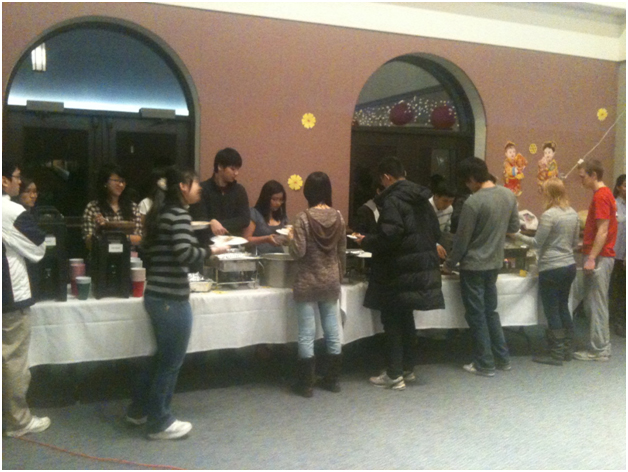
countries, the color red holds the symbolic meaning of luck which added an authentic flare to the Lunar New Year celebration.
Members of VSA gave away small envelopes filled with Asian candies to those who attended as a gift in appreciation of their attendance.
VSA’s celebration of the Lunar New Year gave international students the opportunity to celebrate a holiday tradition away from home.
The event also educated fellow American students on Vietnamese traditions and the diverse taste of their food.
Sophomore Rebecca Overbeeke said, “I liked expanding my taste buds to a different culture, and the fact that the food wasn’t store bought, but prepared by the VSA members showed that they genuinely care about the celebration of their culture. The atmosphere of the entire event was very relaxing too because they were playing soft music that sounded like music from Asia.”
Students involved in VSA set up a buffet-style dinner and served the students some of their favorite traditional Vietnamese dishes.
Some dishes offered included vegetable spring rolls with a peanut butter dipping
sauce, pork, noodles, and sticky rice.
Senior Alex Clapp said, “I
loved all the food and it was
fun to try new dishes I’ve never had before.”
VSA impressed their fellow OWU students who attended the event by preparing and cooking dishes that originated from their Vietnamese culture.
Clapp said, “I was very impressed that all the food was prepared by the students themselves. It was a pretty big turnout of people which allowed the Vietnamese Student Association to share their food and culture with others.”
